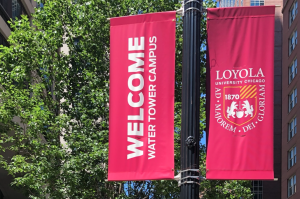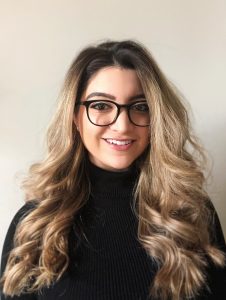My path to intellectual property (IP) law at Loyola University Chicago School of Law has not been a linear one. My undergraduate transcript looks as if every class was put into a hat and drawn at random. For instance, in one quarter of undergrad I took Intro to Biochemistry, Anthropology of Islam, and Food Safety and Regulation. I find many topics and classes interesting and want to learn a little bit of just about anything. My varying interests have been both an asset and a burden throughout my academic career. However, in law school, I am thankful for my unique background for getting me to where I am today.
From Health Care to Law School
As an undergraduate student at the University of Washington in Seattle, I studied Medical Anthropology and Global Health with a minor in Nutritional Sciences. I enjoyed an array of classes, but it was clear to me that I had an overarching interest in healthcare. I was able to view so many aspects of seemingly unrelated studies through the lens of healthcare and hoped to use this in my future career.
Towards the end of my undergraduate studies, I slowly realized that a career as a healthcare provider was not for me. At the University of Washington—one of the top medical schools in the country—it was easy to be caught up in a “med school or bust” mind set. I felt lost and questioned all of my experiences, ranging from volunteering at Seattle Children’s Hospital for five years to traveling to South America for a public health volunteer trip. Had it all been for nothing? At one point, I wondered if I had wasted four years of hard work on a degree with no future employment prospects if I chose not to pursue a career as a healthcare provider.
After several years of working post-undergrad and considering my future plans, I realized law school was a great option for me. When I began the application process, my friends and family were confused. I heard a variety of questions— “are you really qualified?” or “you took biochemistry and microbiology for that?” My answer to both questions was yes.

Benefits of Having an Uncommon Background in Law School
I quickly discovered that my health related background and experiences have been advantageous in my first-year law classes. Even though I did not have law school as a goal in undergrad, my exposure to a wide variety of fields has made the transition to law school relatively simple because I have been used to constantly learning about new and different topics. I think this ease of transition can be extended to any prior educational background, not just STEM or health related coursework.
I believe different and even atypical backgrounds really enrich the law school experience. One of my favorite parts of law school has been the opportunity to hear many different viewpoints and opinions from my law school peers with diverse backgrounds. I learn so much from my classmates and appreciate their experiences, whether they came to law school right out of undergrad or had a career before law school. I have learned to utilize my background in ways to bring in unique ideas into the classroom, whether it be in class discussions or during infamous law school “cold calls”.
Discovering IP Law as a 1L
I was happy to be exposed to IP law in my first semester of law school during Property Law with Professor Paradise. We learned about the basics of IP, including patents, trademarks, and copyrights. I came to realize how vast the IP world is and I started to view many day-to-day things as potential “intellectual property”. Partly because of our discussions of IP in a wide context with real-world examples, ranging from Katy Perry’s music to Barack Obama’s portrait.
My property class helped show me how far reaching the field of IP law is. One example that particularly stands out to me is when I was excited to read a case, John Moore v. The Regents of California, about the ownership and commercialization of DNA. I thought I already knew so much about DNA, including the structure and codes of DNA, and yet, up until that point, I had never thought of DNA as “property.” This experience made me especially interested in IP. This is just one example of how law classes at Loyola can powerfully turn any topic into a new myriad of legal ideas and concerns. For example, prior to law school, I only viewed DNA through a scientific perspective. Now, in addition to my prior perspective, I am knowledgeable about ancillary legal matters concerning DNA—such as regulations and property laws that play a vital role in questions of DNA.
IP Classes and Connections at Loyola
I am glad Loyola provides a number of class offerings related to IP law, including the opportunity to take an IP related elective as a 1L. Currently, I am taking Genetics Law and Policy with Professor Paradise. We have been exploring health and IP-related topics, such as genetic technologies, commercialization, and privacy. I recently wrote a paper for this class on the uses of artificial intelligence in healthcare systems and had a lot of fun conducting research and writing about this area of the law. I have learned so much in this elective, and I look forward to taking more IP law classes. In fact, I already have a list of IP-related classes I am planning to take throughout my next two years of law school, such as Global Access to Medicine and Food and Drug Law.
I’m thankful for the supportive and inspiring professors at Loyola, especially Professor Paradise and Professor Ho. Thanks to their teaching, outreach, and mentorship I have found a deep interest in the intersection between IP and healthcare and I’m excited to pursue a legal career at this nexus. I have also found additional support as a member of the IP Law Society and the Art Law Society, where I have been able to meet students with similar interests while participating in events curated for students interested in IP and art law.
As a Seattle native with no connections to Chicago prior to law school, I am thankful for Loyola’s ample networking events. I have attended multiple IP law events where I had the chance to network with attorneys, some of whom are Loyola graduates, and know exactly what it is like to be in my shoes. For example, every year Loyola hosts an IP Law Student and Alumni Reception which is a great way to connect with Loyola Law alumni practicing IP law. Many of the Loyola alumni have been gracious and very informative by answering questions and providing advice from their real-world perspectives as practicing IP attorneys.
Don’t Be Nervous About IP At Loyola
For any student interested in IP, I urge you to examine your strengths and incorporate them into your daily law studies. You may find an interest in IP without even seeking it out, just as I did. There is no right or wrong way to find your interests in law school, so you should enjoy and embrace the process of trying new things. Loyola is an amazing school to pursue a career in IP law on your own terms, regardless of whether you originally plan to specialize in IP. Coursework in IP at Loyola is flexible and is curated to your own specific interests, such as exploring IP-related issues in sports and entertainment law. Whatever your specific interests are in, Loyola will provide you with guidance, a robust class selection, an abundance of resources, and professors who truly care about the success of their students.

Kiana Baharloo
Assistant Blogger
Loyola University School of Law, J.D. 2022